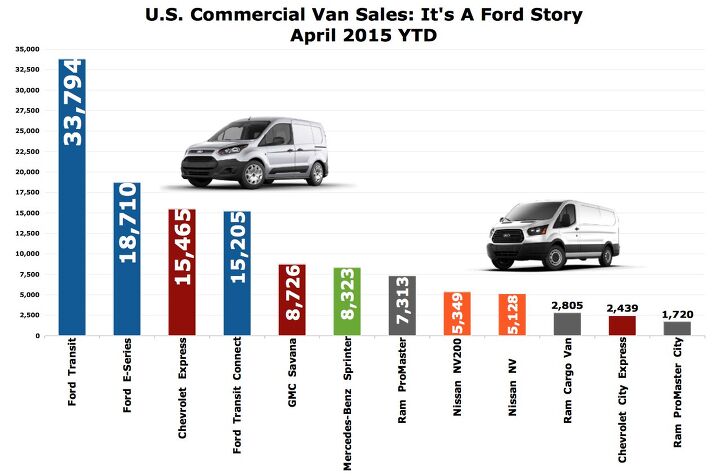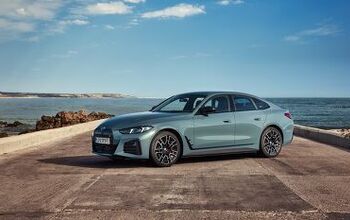Ford Transit Connect Still Owns Half Of U.S. Small Commercial Van Segment
Ford Motor Company’s Transit Connect has seen the number of its direct rivals rapidly expand over the last two years. Not only must the Transit Connect fend off challenges from the Nissan NV200, now Chevrolet sells a version of the Nissan Van and FCA has imported the Fiat Doblo as the Ram ProMaster City.
Nevertheless, Ford still owns more than half the market for small commercial vans. Through the first four months of 2015, a period in which small commercial van volume in the United States has increased 58%, the Transit Connect’s market share stood at 55%. True, that’s down from 63% in the equivalent period one year ago. But a year ago, there was no such thing as a Chevrolet City Express or Ram ProMaster City. Moreover, Transit Connect volume has increased dramatically. Its 38% year-over-year improvement translates to 4,201 extra sales for Ford MoCo over just four months.
The Transit Connect was a productive product for Ford from the beginning. Ford sold 27,405 Transit Connects in the model’s first full year on sale in America, after which Transit Connect sales increased year after year after year. After year. Last year, as Ford launched a second iteration of the Transit Connect, U.S. sales of the van were 58% stronger than in 2010.
This year’s pace through the first one-third suggests Ford will could sell more than 50,000 Transit Connects in the U.S. for the first time in 2015. Sales increased in each of 2015’s first four months, a streak which extended out from December 2014, the Transit Connect’s highest-volume month and first 5K+ month ever. Transit Connect volume has improved on a year-over-year basis in 11 of the last 13 months.
Meanwhile, the Transit Connect is America’s fourth-ranked commercial van overall this year, behind the third-ranked full-size Chevrolet Express and two other Fords. The E-Series replacing Transit and the second-ranked E-Series own 54% of the full-size commercial van market.
Back in the smaller category, the Transit Connect has outsold the Nissan NV200 (sales of which are up 59% this year) by nearly three-to-one. The Ram Cargo Van is quickly disappearing but generated 2,805 sales in the first four months of 2015, more than the competitors from Chevrolet and Ram. City Express sales form 31% of the Nissan/Chevy twin total. Ram’s ProMaster City has only been on sale for four months. February volume was 35% better than January; March sales quadrupled February’s total; April was 98% better than March.
But all of the Transit Connect’s rivals are fighting over less than half the pie. Few vehicles so clearly dominate their respective vehicle categories.
Timothy Cain is the founder of GoodCarBadCar.net, which obsesses over the free and frequent publication of U.S. and Canadian auto sales figures. Follow on Twitter @goodcarbadcar and on Facebook.
More by Timothy Cain
Latest Car Reviews
Read moreLatest Product Reviews
Read moreRecent Comments
- Slavuta Autonomous cars can be used by terrorists.
- W Conrad I'm not afraid of them, but they aren't needed for everyone or everywhere. Long haul and highway driving sure, but in the city, nope.
- Jalop1991 In a manner similar to PHEV being the correct answer, I declare RPVs to be the correct answer here.We're doing it with certain aircraft; why not with cars on the ground, using hardware and tools like Telsa's "FSD" or GM's "SuperCruise" as the base?Take the local Uber driver out of the car, and put him in a professional centralized environment from where he drives me around. The system and the individual car can have awareness as well as gates, but he's responsible for the driving.Put the tech into my car, and let me buy it as needed. I need someone else to drive me home; hit the button and voila, I've hired a driver for the moment. I don't want to drive 11 hours to my vacation spot; hire the remote pilot for that. When I get there, I have my car and he's still at his normal location, piloting cars for other people.The system would allow for driver rest period, like what's required for truckers, so I might end up with multiple people driving me to the coast. I don't care. And they don't have to be physically with me, therefore they can be way cheaper.Charge taxi-type per-mile rates. For long drives, offer per-trip rates. Offer subscriptions, including miles/hours. Whatever.(And for grins, dress the remote pilots all as Johnnie.)Start this out with big rigs. Take the trucker away from the long haul driving, and let him be there for emergencies and the short haul parts of the trip.And in a manner similar to PHEVs being discredited, I fully expect to be razzed for this brilliant idea (not unlike how Alan Kay wasn't recognized until many many years later for his Dynabook vision).
- B-BodyBuick84 Not afraid of AV's as I highly doubt they will ever be %100 viable for our roads. Stop-and-go downtown city or rush hour highway traffic? I can see that, but otherwise there's simply too many variables. Bad weather conditions, faded road lines or markings, reflective surfaces with glare, etc. There's also the issue of cultural norms. About a decade ago there was actually an online test called 'The Morality Machine' one could do online where you were in control of an AV and choose what action to take when a crash was inevitable. I think something like 2.5 million people across the world participated? For example, do you hit and most likely kill the elderly couple strolling across the crosswalk or crash the vehicle into a cement barrier and almost certainly cause the death of the vehicle occupants? What if it's a parent and child? In N. America 98% of people choose to hit the elderly couple and save themselves while in Asia, the exact opposite happened where 98% choose to hit the parent and child. Why? Cultural differences. Asia puts a lot of emphasis on respecting their elderly while N. America has a culture of 'save/ protect the children'. Are these AV's going to respect that culture? Is a VW Jetta or Buick Envision AV going to have different programming depending on whether it's sold in Canada or Taiwan? how's that going to effect legislation and legal battles when a crash inevitibly does happen? These are the true barriers to mass AV adoption, and in the 10 years since that test came out, there has been zero answers or progress on this matter. So no, I'm not afraid of AV's simply because with the exception of a few specific situations, most avenues are going to prove to be a dead-end for automakers.
- Mike Bradley Autonomous cars were developed in Silicon Valley. For new products there, the standard business plan is to put a barely-functioning product on the market right away and wait for the early-adopter customers to find the flaws. That's exactly what's happened. Detroit's plan is pretty much the opposite, but Detroit isn't developing this product. That's why dealers, for instance, haven't been trained in the cars.




































Comments
Join the conversation
By cleverly combining all variants under one name, Ford achieves astounding numbers, and the resulting bragging rights. The same approach works for the F-Series trucks.
Having seen both a high-roof and normal-roof Transit, it looks like Ford designed it as a high-roof from the start, then just chopped the hell out of it. Anyway, Chevy must think WTF that even when it's going away the E-Series still outsells it.